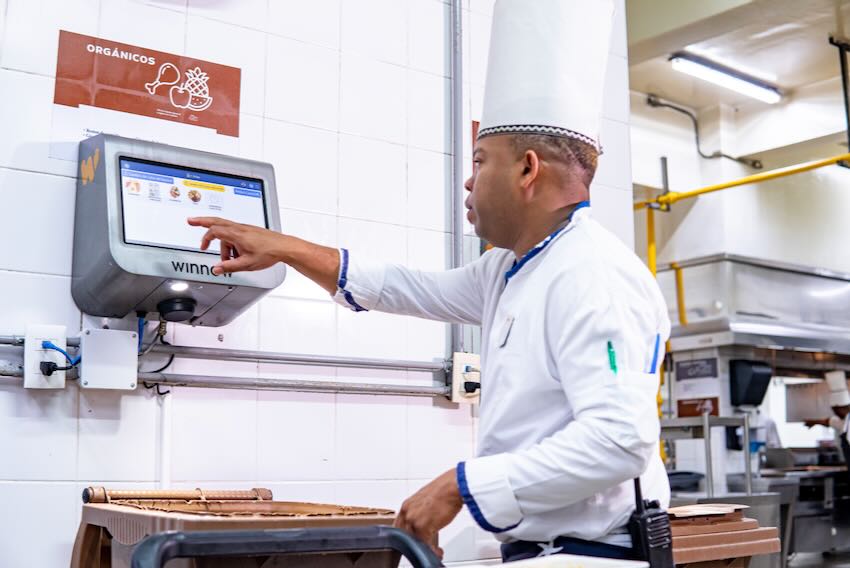
UK: Marriott Hotels UK, Ireland and Nordics has significantly reduced food waste across 53 managed hotels in the first six months of this year.
The group has partnered with Winnow and its AI technology to monitor and minimise food waste in 53 of its hotel kitchens, training staff and educating teams and guests on circularity.
Over six months (from January until June) the results showed the hotels had reduced food waste by 25 per cent. What does this really mean? Before Winnow came to the hotel, the Green Key accredited property was already practising sustainable food initiatives such as meat-free Mondays, an a la carte breakfast instead of the buffet option, smaller plates, and so on.
The difference is now the data from Winnow’s reports for this period can be used as a benchmark for future food waste reduction for all the hotels taking part.
According to Marriott, with the support of The PLEDGE, a global food waste certification, it has become the first hotel group to deploy AI food waste technology on this scale in the UK.
Sheena Williams, cluster general manager UK, who was instrumental in leading the Winnow integration for the hotels and achieving the food waste certifications said the technology had “changed the way we work for the better”.
Winnow AI gives F&B teams across the hotels access to real-time data on food consumption and waste and the idea is that this will enable smarter decisions around the procurement of food for the kitchen, as well as menu planning, and portion sizes.
Winnow is used in more than 2,700 locations globally and is a registered B Corporation operating in 85 countries. According to Winnow its users are saving USD$70m annually, which is the equivalent of 50 million meals a year from being wasted.
Sustainable Hotel News attended an evening at the London Heathrow Marriott hotel last night where award-winning executive chef, and sustainability champion at the hotel, Anna Pazdera showed us behind-the-scenes in the kitchen.
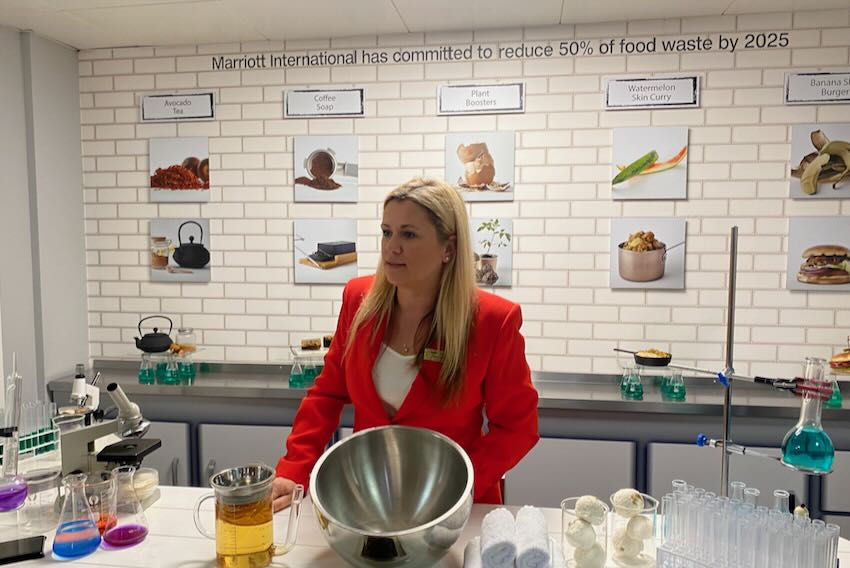
The hotel has three kitchens and we visited the food lab where the zero waste recipes and low impact menus are designed.
Most hotel kitchens waste 5-15 per cent of the food they buy, but here peelings and other offcuts, which might previously have been treated as waste, are re-used for creations such as avocado tea, watermelon peel curry, banana peel “pulled pork” burgers and coffee soap and compost. Pickles and preserves are also made with peelings and dried vegetable or fruit skin.
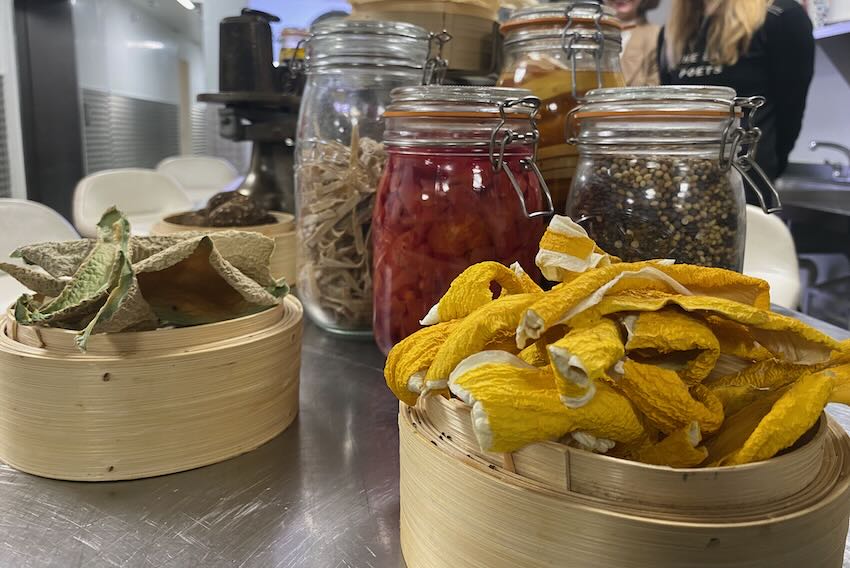
The kitchen houses a hydroponic garden, which is powered by the wind turbine and solar panels on the roof of the hotel, where a small green house also provides salads and garnishes, as well as herbs, for the food and beverage team.
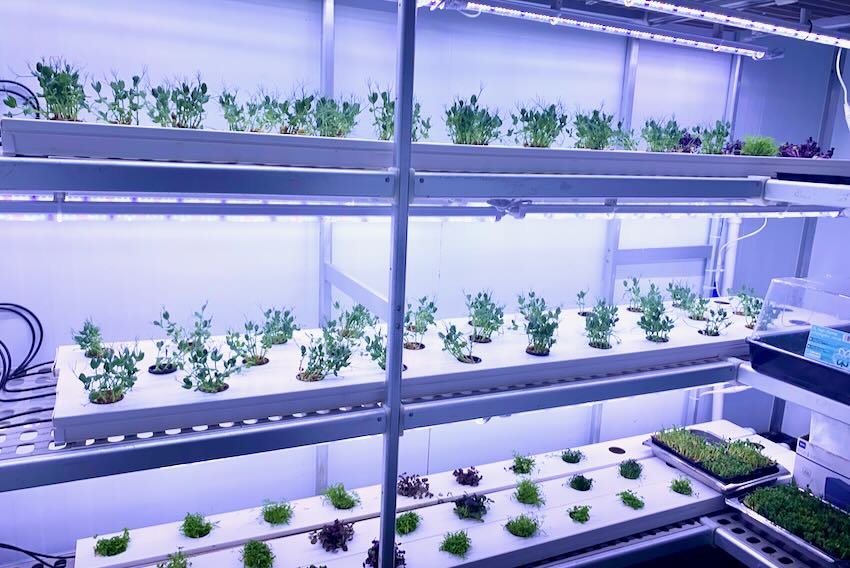
David Jackson, director of marketing and public affairs, Winnow was also at the hotel to demonstrate the Winnow AI technology in the kitchen.
The machine has sensors which take a photo of the food as it is put into a large kitchen bin and the user is given a choice of foods to select. For example, Jackson chucked in some cabbage leaves and he was given the option to choose broccoli, lettuce or cabbage leaves. Once the food has been identified the weight and cost of the ‘waste product’, as well as the carbon footprint, is all calculated and delivered to the hotel teams in a report, which shows where they can save on both food waste and cost to the kitchen.
While Winnow can recognise 1,000 different foods, challenges for the technology includes “plate waste” when guests leave food on their plates and this is scraped into the bin. However Jackson said the technology will soon catch up and be able to identify all types of waste.
Marriott has been using Winnow for six months and Pazdera said of the AI technology: “Reducing food waste has been a priority for us for some time. It’s been incredible to see the progress we’ve made to tackle this issue with the help of AI.
“The insights we’re getting allow us to make immediate adjustments in the kitchen, which not only helps us reduce waste but also gives us the opportunity to get creative with surplus ingredients, like turning banana peel into pulled pork for our signature vegetarian burgers.”
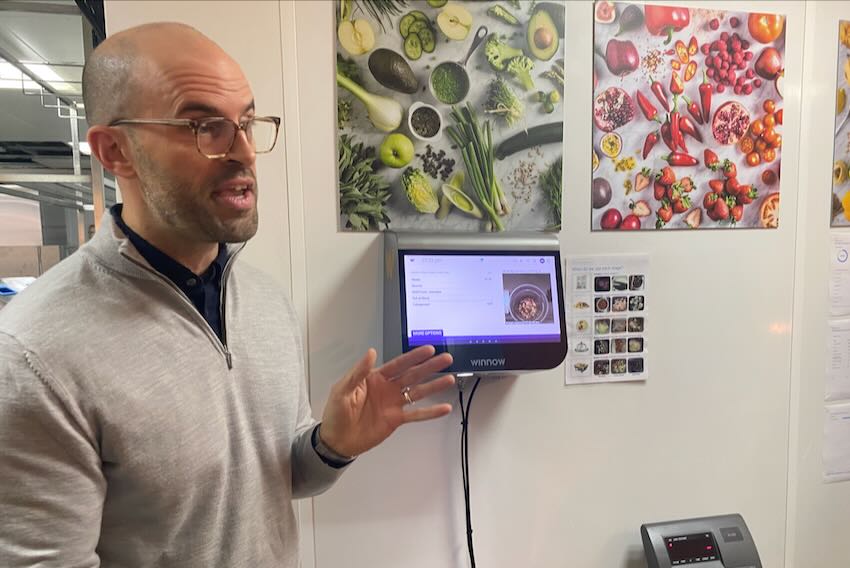
The food waste initiatives across Marriott’s hotels extends to encouraging mindfulness around food consumption, with hotels offering guests smaller portion options and raising awareness of responsible dining, particularly at buffets.
The London Heathrow Marriott hotel does not have a breakfast buffet, but instead offers an extensive a la carte menu at its Carluccio’s restaurant.
Other hotels have introduced QR codes on menus, giving guests access to zero-waste recipe ideas and tips on reducing waste at home.
Additional partnerships with local food banks and organisations, such as Too Good to Go, are in place to redistribute surplus food, and unavoidable food waste is diverted towards composting or recycling.
Joanna Chugh, area vice president for UK, Ireland, and Nordics for Marriott International said: “We are incredibly proud of the tremendous effort and dedication of our teams in reducing food waste across our hotels.
“With more than 3,000 team members — including culinary staff, kitchen stewards, and F&B services — working together, we’ve already achieved a 25 per cent reduction in food waste within six months – the equivalent of 486 tonnes of C02 from being released into the atmosphere.”
This is like charging more than 32 million mobile phones or driving 1,250,651 miles in an average petrol-powered passenger vehicle.
Winnow’s Jackson added: “We’re thrilled to see how Marriott’s teams have embraced our technology to achieve such impressive results. This partnership highlights how technology, combined with Marriott’s commitment and collective efforts, can lead the way setting a new standard for the hospitality industry.”
All the UK, Ireland and Nordic managed Marriott hotels are Green Key certified. To achieve Green Key certification, hotels must meet criteria in areas such as energy efficiency, water conservation, waste management, and the use of sustainable products.
In June this year Winnow became a member of the World Sustainable Hospitality Alliance. See more below.
Images: Boodle McDougall

